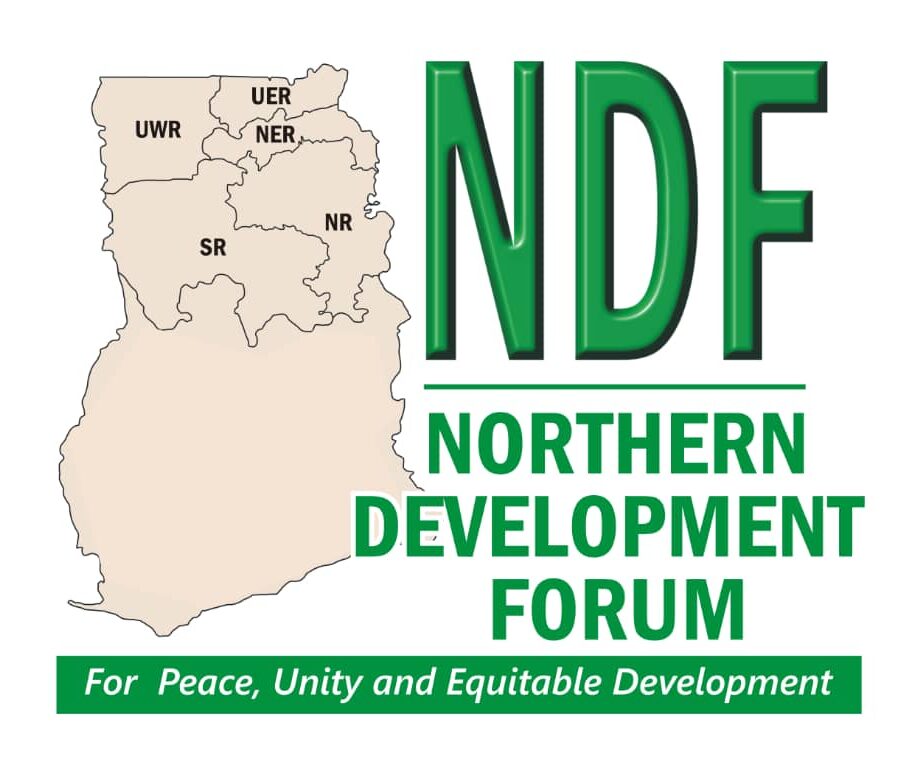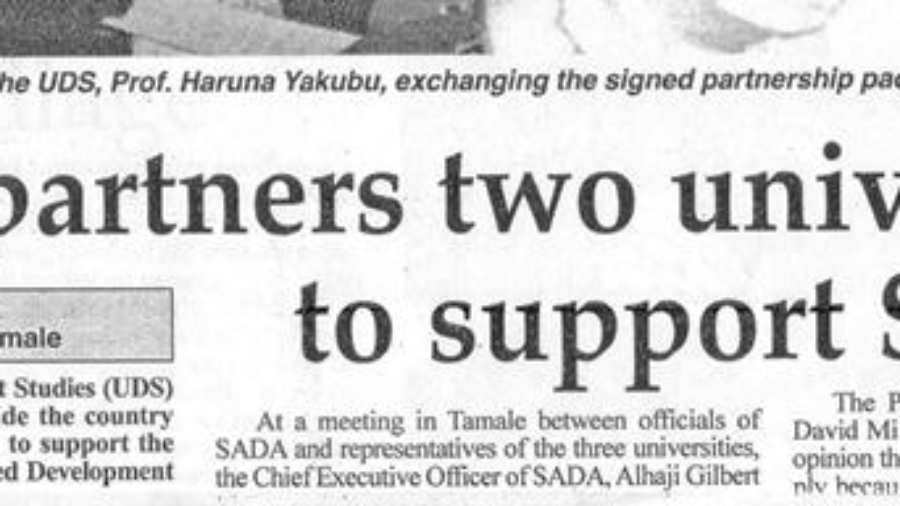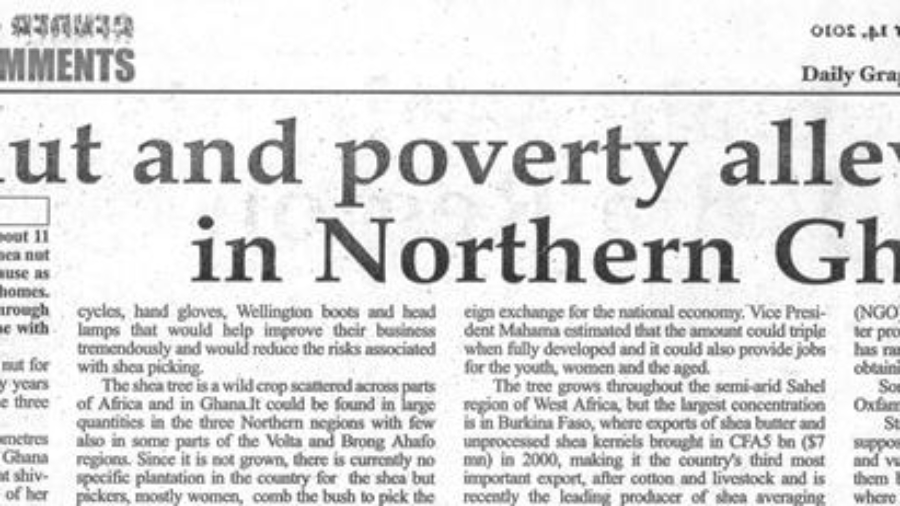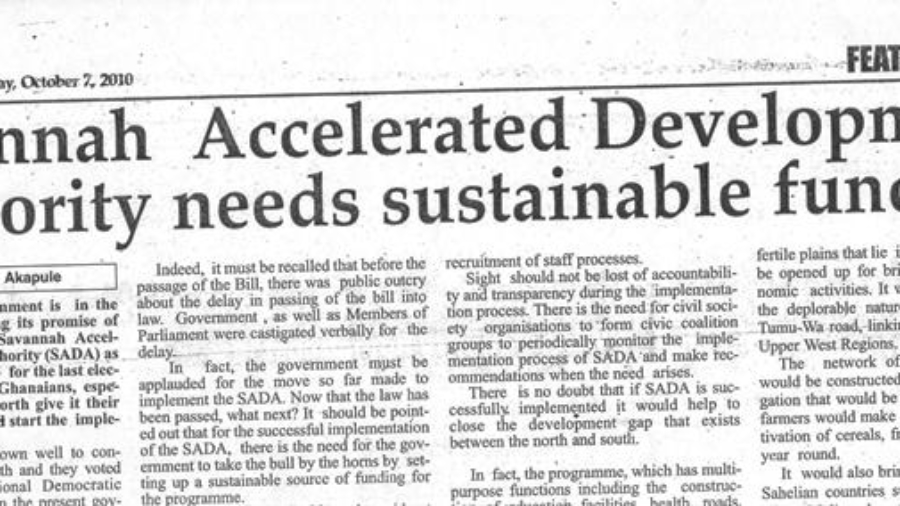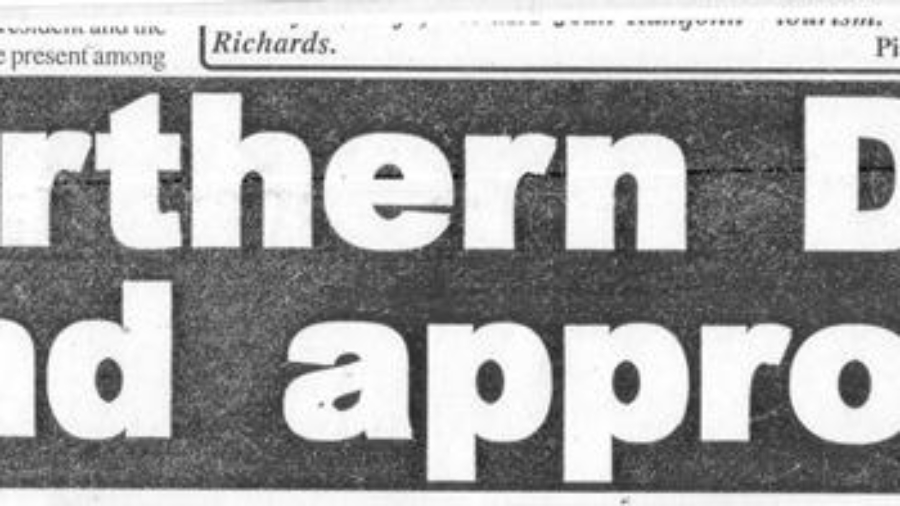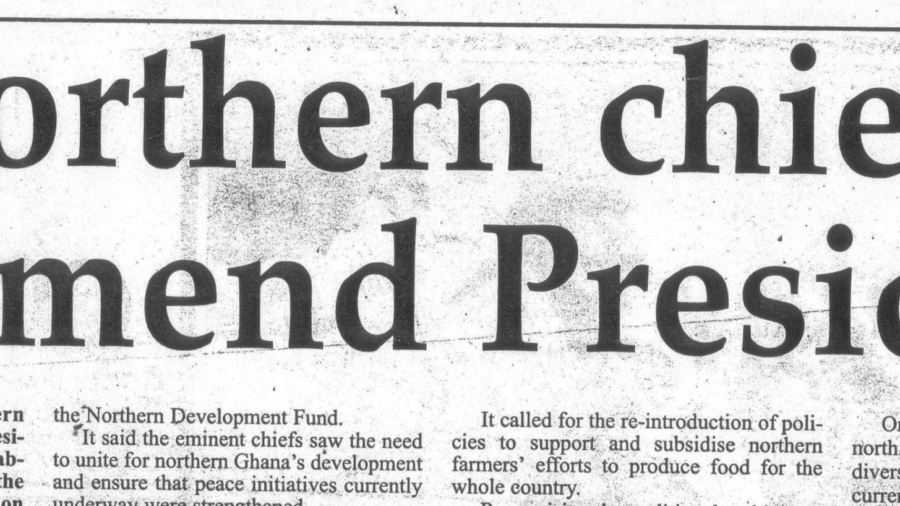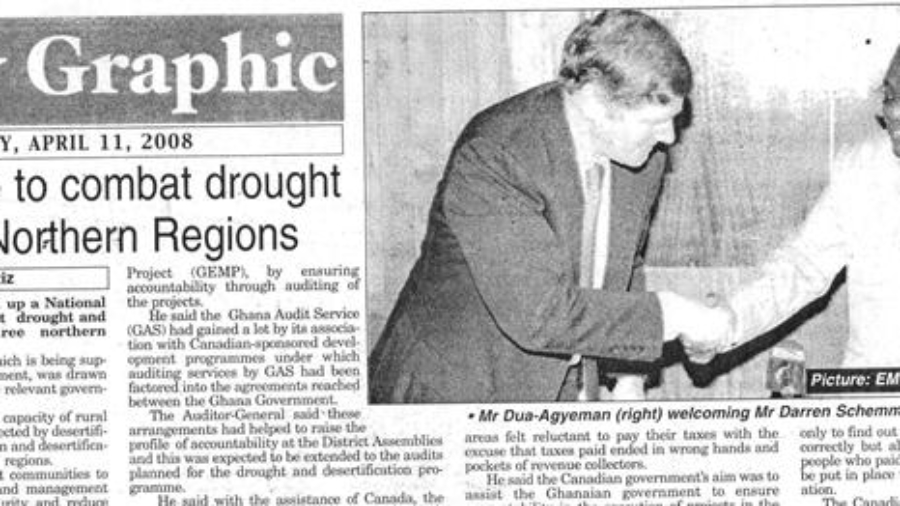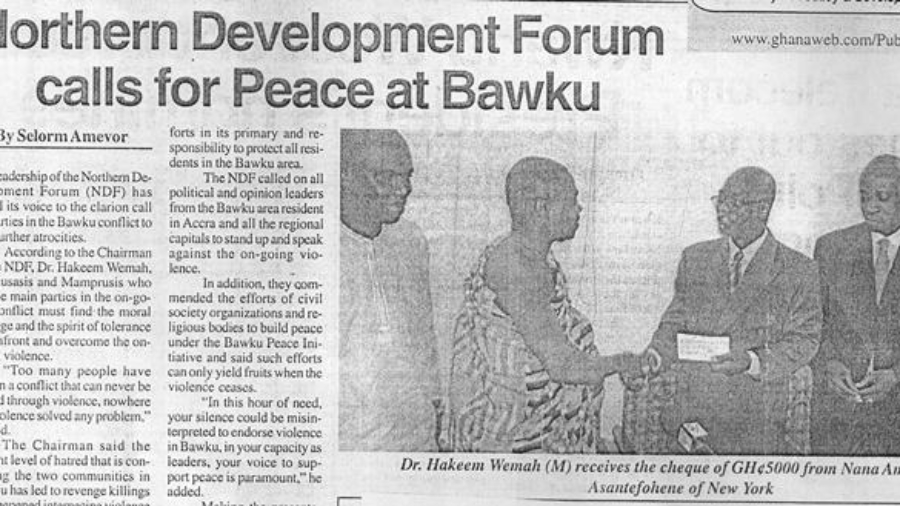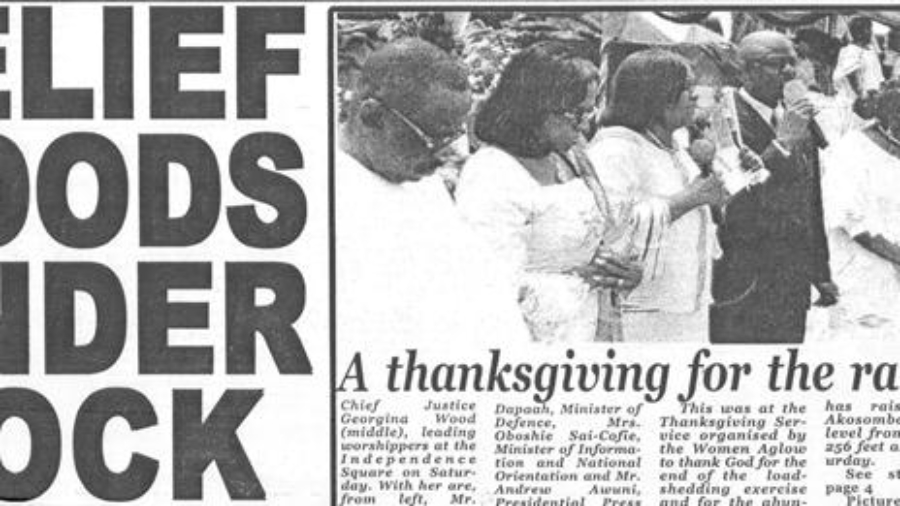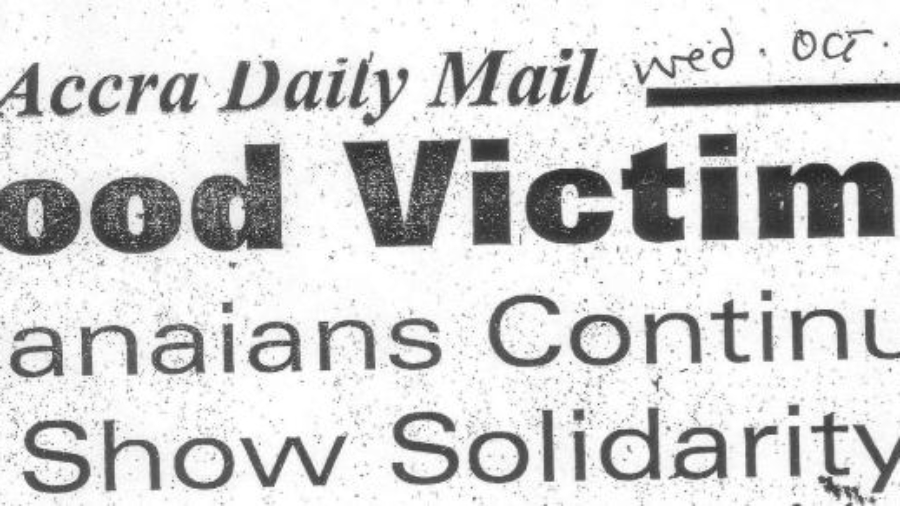DAILY GRAPHIC
WENEDAY 30th NOVEMBER, 2011
UDS PARTNERS TWO UNIVERSITIES TO SUPPORT SADA
STORY BY: Nururdeen Salifu, Tamale
The University for Development Studies (UDS) and two other universities outside the country have entered into a partnership to support the work of the Savannah Accelerated Development Authority (SADA).
The UDS, the University of Louisville (UofL) and the University of West Indies (UWI) will undertake joint research and feasibility studies on a number of development interventions challenges of the north.
Additionally, the UDS has the unique exposure and knowledge of the culture and living conditions in the Savannah areas. It also boast a rich experience in community entry, community mobilization and the sue of participatory rural appraisal techniques.
At a meeting in Tamale between the officials of SADA and representatives of the three universities, the Chief Executive Officer of SADA, Alhaji Gilbert Iddi, noted that the partnership among the three universities would focus on research in areas relevant to the mandate of SADA.
“They would conduct appraisals and feasibility studies on the project we intend to implement. They would also look into value-addition for a number of products,” he stated.
Alhaji Iddi mentioned that SADA intended to establish industrial villages, where various people involve in local industries such as the agro and smock industries could work together.
“These industrial villages would have a cluster of small and medium scale business. When they are together, it becomes easier for SADA and other partners to extend a hand of support to them,” he explained.
The Pro-Vice Chancellor of the UDS, Prof. David Miller, noted that many people were of the opinion that SADA has not started operations, simply because they had not seen any physical structures.
“SADA started working since the law was passed and we have been working hand in hand with it to bring into fruition a number of initiatives. For us, knowledge is not relevant until it is seen to be contributing to the advancement of our communities,” he noted.
The leader of the visiting team, which comprised staff of the UofL and UWI, Dr. Therisa Rajack-Talley, said the two foreign universities would do collaborative research and academic exchanges with the UDS in a number of areas.
These areas, she mentioned, included women and gender development, peace and Pan-African studies, mental health, pediatrics, nutrition and participatory development.
SHEA NUT AND POVERTY ALLEVIATION IN NORTHERN GHANA
DAILY GRAPHIC
THURSDAY, OCTOBER 14, 2010
SHEA NUT AND POVERTY ALLEVIATION IN NORTHERN GHANA
STORY BY: PAUL ACHONGO KWODE
Felecia Kawe (pseudonym) was about 11 years of age when she died through shea nut picking. She did not die a natural cause as is the case in most traditional Ghanaian homes. Kawe died stragely on May 16, 2010 through snake bite in the bush where she had gone with friends at dawn to bring home shea nuts.
Her family of four depended on the shea nut for their daily living since their father died many years ago leaving the blind mother to bring up the three children alone.
Manyoro is a village of about 53 kilometres from Nanvrongo is the Upper East Region of Ghana where she lived. The death of Kawe sent great shivering throughout the village not only because of her death, but rather how the family was going to cope since she was the bread winner of the family.
Their dependence on the shea nut for their daily living occurs mostly at the peak of the shea season during the months of April-August. They did not only depend on it for only their breakfast but lunch and supper.
Her death illustrate a clear case of high risks associated with shea nut picking. Kawe’s tragic death is only one out of many who die during shea picking. Most of the shea nut pickers across the shea producing parts of the country do not have any protective clothing, Wellington boots, hand gloves and this exposes them to harmful creatures and the weather.
The conditions shea nut pickers go through before picking the nuts are too dangerous. The pickers have on countless occasions complained and appealed to the government and civil society and NGO’s to assist them with protective kits.
Some of their complaints include being bitten by snakes because they use their bare hands and sometimes bare feet to comb the bush in search of the nut.
Madam Abdulai Zuwera of the Tungteiya Shea Butter Extraction Women Association of Gushiegu told this writer that “It is out of the nut that we make our daily living and support our children in schools and if the business is left to collapse, where will our future be?”
Madam Zuwera said she would be grateful if members of the association were assisted with tricycles, hand gloves, Wellington boots and head lamps that would help improve their business tremendously and would reduce the risks associated with shea picking.
The shea tree is a wild crop scattered across parts of Africa and in Ghana. It could be found in large quantities in the three Northern regions with few also in some parts of the Volta and Brong Ahafo regions. Since it is not grown, there is currently no specific plantation in the country for the shea but pickers, mostly women, comb the bush to pick the nut. Such a practice results in a large proportion of the nuts being lost.
Shea is often referred to as “Life” especially in Dioula language in Burkina Faso and where it is also generally grown wild, with little need for any speial cultivation or nourishment. There are a few plantations of the crop in Burkina Faso. In Burkina Faso, it is called “women’s gold.”
Almost all parts of the tree have some practical use. The bark is an ingredient in traditional medicines against certain childhood ailments and minor bruises and cuts. The shell of the nuts can repel mosquitoes.
Above all, the fruity part of the nut, when crushed, yields a vegetable oil that could be used in cooking, soap-making and for skin and hair care. Harvesting the nuts and making the butter have traditionally been women’s work. Men usually are involved only in its transportation and marketing.
The cash crop shea is also valuable for the treatment of certain diseases by herbalists. It also offers employment for several individuals who take part in all of its value chain processes. According to the Vice President of Ghana, John Dramani Mahama, more than 900,000 women in the three Northern regions, collect over 130,000 tonnes of dry nuts annually. The industry also benefits close to two million poor people, about 95 per cent of whom are rural households, though its full potential is yet to be exploited. The infant industry is an attractive business venture earning about 30 million dollars of foreign exchange for the national economy, Vice President Mahama estimated that the amount could triple when fully developed and it could also provide jobs for the youth, women and the aged.
The tree grows throughout the semi-arid Sahel region of West Africa, but the largest concentration is in Burkina Faso, where exports of shea butter and unprocessed shea kernels brought in CFA5 bn ($7mn) in 2000, making it the country’s third most important export, after cotton and livestock and is recently the leading producer of shea averaging 50,000Mt while Ghana follows second with production of 45,000MT per annum.
It was therefore heartwarming when Dr. Joshua Yidana, Head of the Horticultural Department of the University for Development Studies (UDS) told this writer that he had been experimenting with the shea tree through grafting propagation.
According to him, the method had proved that the shea tree, through grafting, could bear fruit in a gestation period of between three to six years. He said the research was a breakthrough and if successfully implemented could reduce the gestation period of the crop from 10-15 years to between three to six years and therefore increase production of its products.
The findings are intended to enable farmers and the government to grow the crop just as it is with cocoa.
DR. Yidana said the first ever grafting of the shea nut was successful in 2008 and that he was studying the grafting method at Zoonaaliyi near Nyakpala where about 1,200 grafted plants covering about a hectare of land was being observed. Dr. Yidana’s experiments just like any other academic work have generated heated debates in the academic circles particularly from the Cocoa Research Institute of Ghana (CRIG) which expressed doubt about the findings.
According to them, they had been making several studies on the plant especially on its gestation period but were yet to come to such conclusions.
A lot of Non-Governmental Organization (NGO) have shown interest in promoting shea butter production and marketing in Ghana and support had ranged from linkages to markets, assistance on obtaining technology and training in business skills.
Some of these NGO’s are Send Ghana, SNV, Oxfam, GTZ.
Strangely enough, some of these NGO’s which supposedly aims at protecting the interest of the poor and vulnerable in the shea industry turn to exploit them by setting up some shea processing centres where women pick and process the shea. The poor and vulnerable are usually cheated at the point of purchase as their products are bought cheaply by some of these NGO’s.
Another point of cheating is through the value chain as the companies in the shea industry make huge profits at the expense of the poor.
Some of the NGOs also give loans or credits to these vulnerable farmers in the shea sector with huge interest rates. It is however that the NGOs advocate the best for the shea industry but the interest of the vulnerable farmers must be paramount else they may be using the poor farmers to fight for their own interest. Some of the interventions of some NGOs must however be lauded.
It appears that the shea industry faces numerous challenges which are surmountable. Some other challenges the shea industry is faced with include uncontrolled pricing both locally and internationally, inadequate information of the crop due to limited research, bush burning, loss of shea tree through cutting the trees for charcoal and a host of other problems that needs to be addressed to pave way for more investment with great dividend for the shea industry.
The intervention will not only alleviate poverty through job creation but also contribute to meeting the Millennium Development Goal of reducing poverty as well as enhancing the socio-economic fortune of the country.
There seem to be hope for the shea industry with the ongoing implementation of the Savannah Accelerated Development Authority (SADA).
SAVANNAH ACCELERATED DEVELOPMENT AUTHORITY NEEDS SUSTAINABLE FUNDING
DAILY GRAPHIC
THURSDAY 7 OCTOBER, 2010
SAVANNAH ACCELERATED DEVELOPMENT AUTHORITY NEEDS SUSTAINABLE FUNDING
STORY BY: Samuel Adadi Akapule
The current government is in the process of fulfilling its promise of implementing the Savannah Accelerated Development Authority (SADA) as captured in its manifesto for the last election campaign, that if Ghanaians, especially those from the north it their mandate to rule, it will start the implementation of SADA.
The message went down well to convince people of the north and they voted massively for the National Democratic Congress (NDC) to form the present government.
However, when the government came into power and had not implemented the SADA, many people from the northern parts of the country were becoming impatient and disillusioned. Civil society organization such as SEND Ghana and the Integrated Social Development Center (ISODEC) emerged vigorously with advocacy reminding the government of its promise to implement SADA.
At one of such advocacy forums organized by SEND Ghana in Bulgatanga in the Upper East Region. Participants advocated strongly that it was time the Bill, which was before parliament was passed into law to facilitate the implementation process.
When parliament in August 2010 passed the Bill into law and received the president’s signature in September 2010, it attracted a lot of commendation from the people, especially those of northern descent. Bodies from the northern parts of the country including the Northern Development Forum (NDF) paid great tribute to the government for the passage of the law.
Indeed, it must be recalled that before the passage of the Bill, there was public outcry about the delay in passing of the bill into law. Governments, as well as Members of Parliament were castigated verbally for the delay.
In fact, the government must be applauded for the move so far made to implement the SADA. Now that the law has been passed, what next? It should be pointed out that for the successful implementation of the SADA, there is the need for the government to take the bull by the horn by setting a sustainable source of funding for the programme.
It must be emphasized here that without a sustainable funding component, implementation of SADA would stall and this would have dire consequences on the NDC during Election 2012.
The funding should be donor driving else it will defeat the purpose of establishing SADA. At a forum a forum organized inn Bolgatanga by SEND Ghana; participants stressed the need for the government to set up a special tax system to attract sustainable funding for the implementation process.
It is very crucial for the government to consider the views expressed by the participants at the forum to ensure the successful implementation of SADA.
Other civil society organizations including NDF; ISODEC; Foundation for Grass Roots Initiatives in Africa have expressed similar views of establishing sustainable funding for the programme.
Again, the recruitment process into the programme should be based on competence, devoid of ethnicity, political and religious grounds. Dedication and honesty should also be important determination factors in the recruitment of staff processes.
Sight should not be lost of accountability and transparency during the implementation process. There is the need for civil society to organization to form civic coalition to periodically monitor the implementation processes of SADA and make recommendations when the need arises.
There is no doubt that if SADA is successfully implemented it will help to close the development gap that exist between the north and south.
In fact, the programme, which has multi-purpose functions including the construction of educational facilities, health, road; agriculture among other things, would in no doubt reduce poverty in the area and curb the current rural urban drift.
Let the government show more commitment to the implementation processes. A successful implementation of the programme would give it much credibility since it will go down well in the history books of Ghana for posterity to see that it was the only government that could turn out a feasible to bridge the north-south development gap.
The projects coverage areas in the three Northern Regions are the Northern, Upper East and Upper West and also the savannah areas of the Brong-Ahafo and parts of the Volta Region. It is expected that when the programme is given special attention, it would help to reduce poverty and facilitate adaptation to climatic changes and ecological transformation of northern Ghana.
It will create a circular road network that would connect the Upper West, Upper East and Northern Regions such that large fertile plains that lie in these regions, would be opened up for brisk farming and economic activities. It will help to improve the durable nature of the Navrongo-Tumu- Wa road, linking the Upper East and Upper West Regions.
The network of drainage canals that would be constructed to facilitate drip irrigation that would be owned by smallholder farmers would make it possible for the cultivation of cereals, fruits and vegetables all year round.
It would also bring strong linkage with Sahelian countries such as Burkina Faso, Niger, Mali and northern cote d’Ivoire and this would open up a true regional market for goods and services, with northern Ghana as a competitive supply and industrial hub. It must be pointed out that the attempt at bridging the north and south development gap has been a long standing dream of many post-independent government of Ghana. There had been previous attempt – Northern Region Rural Integrated Project (NORRIP); Irrigation Company of Upper Region (ICOUR); Land Conservation and Small-Holder Rehabilitation Project (LACOSREP) and Farmer’s Services Company (FASCOM) – but all this failed to make the desired impact because of mismanagement. It is the hope of this writer that SADA would not go the way of its predecessors.
NOTHERN DEV. FUND APPROVED
THE GHANAIAN TIMES
SATURDAY 8th Nov, 2008
NOTHERN DEV. FUND APPROVED
By: Salifu Abdul-Rahaman
Parliament passed the Northern Development Fund Bill to provide a long term strategy for transforming and accelerating the development of the northern Ghana.
Dr, Anthony Akoto Osei, Minister of State at the Ministry of Finance and Development Planning, moved for the passage of the bill and was seconded by Nii Daku Adu Mante (NPP-Korle Klottey), Chairman of the Finance Committee.
The components of the strategy include community-driven development actions, focusing on small-holder agriculture and off-farm investments to create opportunities for the poor.
The fund will also be used to implement strategic infrastructure in roads, energy and water resources, flood initiation, environmental renewal investments, as well as food, livelihood, security and peace initiatives.
The Finance’s Committee’s report on the bill noted that the slow growth in the northern sector had delayed and reduced Ghana’s attainment of the Millennium Development Goals and middle-income status.
He said it was necessary to create a “growth pole” linking northern Ghana and the neighboring Sahelian countries to contribute to overall national development.
It is recalled that the government’s budget and economic policy statement for this year had a provision for seed money of GH₵25 million for the establishment of a Northern Development Fund to address the development gap and help alleviate the chronic poverty in the area.
The report predicted that with the global climatic change, the frequency of drought and sporadic flood in the north would increase, adding that such persistent climatic change phenomenon was already affecting the re-charge of Ghana’s water bodies while causing destruction of lives and livelihood in most parts of the area.
The committee explained that the fund was not meant to be a substitute for existing and traditional government funding towards the three regions – Northern, Upper-East and Upper West regions.
As part of measures to comprehensively develop the area, Parliament approved a loan agreement between the government and a Brazilian bank for 500 million dollars to construct hydroelectric dams at Pwalugu and Juale in the Upper East and the Northern Regions respectively, to ensure sustainable energy supply.
The state is enjoined in the Directive Principles of State Policy under Article 36 (2) of the Constitution to take the necessary steps to establish a healthy economy through balanced development of all regions and improvement of conditions of life in the rural areas.
The imbalances in the developments between the rural and urban areas should be addressed to ensure balanced development, the report of the committee stressed.
It noted that in considering the bill the Minister of state, Dr. Akoto-Osei and Professor Gyan-Baffour, the Deputy Minister, the consultants on the fund project, as well as other stakeholders were consulted to make inputs.
Traditional authorities if the north were engage to review of the strategic proposal which aims at reducing poverty in the area to about 20 per cent within 15 years of the Bill, prior to the finalization.
In a related development, Parliament approved a loan agreement of 59.5 million dollars between Northern Ghana Groundnuts Limited and Helios Investment partners of United Kingdom, with the government as a guarantor to develop and promotes growing of groundnuts to international standard.
NORTHERN CHIEFS COMMEND PRESIDENT
DAILY GRAPHIC
MONDAY 20 OCTOBER, 2008
NORTHERN CHIEFS COMMEND PRESIDENT
Chiefs of the three northern regions have commended President J. A. Kufour for the establishment of a development fund for the three northern regions and called on Parliament to approve the passage of the bill into an act.
They also called on Members of Parliament (MPs) from the north to support the process of the passage of the bill.
A forum of 25 chiefs from all the three northern regions urged all the regional houses of chiefs in the northern part of the country to show public support for the passage of the fund and educate all traditional councils and their people on the fund.
A communiqué issued at the end of the forum urged the government to speed up the implementation of the programs of the Northern Development Fund.
It said the eminent chiefs saw the need to unite for northern Ghana’s development and ensure that peace initiatives currently underway were strengthened.
It said conflict prevention efforts should be directed towards earl-warning rather than security responses, stressing the “chiefs should be prepared to engage in these early warning systems and act decisively to mediate when issues of potential conflicts are looming”.
On agriculture, the chiefs observed that there had not been adequate adherence to politics, pointing out that past politics such as FASCOM and Operation Feed Yourself ensured that the north was self-sufficient in maize and rice but those initiatives were discontinued.
It called for the re-introduction of policies to support and subsidies northern farmers’ efforts to produce food for the whole country.
Recognizing the traditional and important role of sheanuts, the chiefs said improved varieties of sheanuts should be used to permanent source of income for farmers.
The communiqué called for the implementation of a strategy for a forested north.
It called on people from the north to stop the practice of felling economic trees for burning charcoal and protect all the vital eco-systems and rivers, while chiefs took steps to stop bush burning.
On finding of the development in the north, the chiefs stressed the need for the diversification of sources of finding since current sources of budget funding were not adequate.
It said chiefs recognized the importance of gender issues and, therefore, urged the farmers of the development strategy to include women in all the institutions in the planning and managing of the Northern Development Initiative.
The communiqué and women must also be included on all boards designed to provide guidance for the fund and the development strategy and in addition, they should also receive the same benefits as men and be protected sufficiently in carrying out their vocations.
MP CALLS FOR LI ON NORTHERN FUND
DAILY GRAPHIC
FRIDAY, APRIL 11, 2008
MP CALLS FOR LI ON NORTHERN FUND
STORY BY: SAMUEL ABAANE, BOLGATANGA
The government has been asked to pass a Legislative Instrument (LI) that will spell out the administrative instruments, legal boundaries and activities of the Northern Ghana Development Fund (NGDF).
In the absence of that, the fund can be regarded as another one of the many initiatives established by governments to whittle down people’s concerns over what has now become the north-south divide.
The Member of Parliament (MP) for Mion in the Northern Region, Dr. Alhassan Ahmed Yakubu, made the call in Bolgatanga when he delivered a paper on, “The Northern Ghana Development Fund: Issues of Concern”, at the just-ended Northern Easter School.
The Northern Easter School, which was held on the theme: “Setting a Development Agenda for Northern Ghana”, was aimed at setting up a new development agenda for northern Ghana.
The Institute of Adult Education of the University of Ghana was the organizer of this year’s school, which is rotated among the three northern regions.
The general public, development consultants, teachers, labour-unions, district assemblies, politicians and academia usually participate in the deliberations of the school.
The MP, who is also a Ranking Member of the Committee of Food, Agriculture and Cocoa Affairs, said northern Ghana had what it took to be more economically independent but said what was lacking was the political and social mobilization attitude that would convert that potential into economic benefit.
He noted that northern Ghana was disadvantaged in terms of numbers and the complement of experts dealing with national development policies.
“Currently, there is likely to be no northern representation on the National Development planning commission (NDPC) and other very important national bodies set up to determine the development agenda of the country,” the MP explained.
Dr. Yakubu suggested that the NDPC should have a decentralized ownership as an essential ingredient in order to make development more equitable.
He also suggested of a Northern Ghana Development Planning Commission based in the north to see to the transparent administration of the NGDF.
“its popularity should rather make the government invest more in the relevant areas of northern Ghana and not reduce national budget allocation to the north because of the invisibility of regional allocation in the budget,” he stressed.
The MP pointed out that agricultural development, with a strong sustainable environmental protection dimension, must be an important instrument for development in capturing projects aimed at the economic emancipation of the north.
Such projects, he indicated, should engage the entire value chain, rather than the current system that exported wealth out of the region, since value addition remained rudimental in northern agriculture.
Also delivering a paper on “Special Initiative on Sustainable Development of Northern Ghana” a policy analyst at the office of the president Mr. Ernest Patrick Mallet, said the government, having realized that the socio-economic development gap between the northern region and the rest of the country could not be easily bridged with budgetary allocation alone, decided in its 2008 budget to the institute a “Special Initiative on Sustainable Development of Northern Ghana.”
“Closing the gap will not be event that will occur in time but it is a process that will take time, continuous efforts and commitment to see it through.” He said.
He said it should be a process that would take the whole country to the achievement of at least all the Millennium Development Goals (MDGs) simultaneously.
The policy analyst urged the participants to consider innovative ways of making the NGDF seed money of GH₵25 million to grow, since budgetary source alone might not be adequate to meet the expected high expenditure in implementing the initiative.
PROGRAMME TO COMBAT DROUGHT IN THREE NORTHERN REGIONS
DAILY GRAPHIC
FRIDAY, APRIL 11, 2008
PROGRAMME TO COMBAT DROUGHT IN THREE NORTHERN REGIONS
STORY BY: ABDUL AZIZ
The Government had drawn up a National Action Programme to combat drought and desertification in the three northern regions.
The five-year programme, which is being supported by the Canadian Government, was drawn up in close collaboration with the relevant government institutions.
The aim is to strengthen the capacity of rural institutions and communities affected by desertification to reverse land degradation and desertification trends in the three northern regions.
The project would also assist communities to adopt sustainable water and land management systems that improve food security and reduce poverty.
This came to light when the Canadian High Commissioner in Accra, Mr. Darren Schemmer, paid a courtesy call on the Auditor-General, Mr. Edward Dua-Agyeman, at his office yesterday.
Mr. Dua-Agyeman said the audit service was ready to collaborate with the implementing agency, the Ghana Environment Management Project (GEMP), by ensuring accountability through auditing of the projects
He said the Ghana Audit Service (GAS) had gained a lot by its association with Canadian-sponsored development programmes under which auditing services by GAS had been factored into the agreements reached between the Ghana Government.
The Auditor-General said these arrangements had helped to raise the profile of accountability at the District Assemblies and this was expected to be extended to the audits planned for the drought and desertification programme.
He said with the assistance of Canada, the government has established a liaison office at the Ringway Estates for the Public Accounts Committee and the Audit Service.
Mr. Dua-Agyeman assured the high commissioner that the seventh report of the Public Accounts Committee would be presented to Parliament in June, this year.
Mr. Schemmer said often people in the rural areas felt reluctant to pay their taxes with the excuse that taxes paid ended in wrong hands and pockets of revenue collectors.
He said the Canadian government’s aim was to assist the Ghanaian government to ensure accountability in the execution of projects in the rural areas by ensuring proper auditing of projects to reduce the incidence of corruption.
He explained that when the rural people began to see that their taxes were being put to good use, they would readily endeavor to meet their tax obligation promptly as studies had shown.
Mr. Schemmer said auditing, therefore, was not only to find out whether the funds had been used correctly but also to study the behavior of the people who paid the taxes so that measures could be put in place to ensure their maximum co-operation.
The Canadian High Commissioner expressed satisfaction that sanctions based on audit reports by GAS had made District Assemblies executing Canadian-founded projects to sit up.
Mr. Schemmer noted that the positive impact could be replicated in all the other sectors in the District Assemblies to ensure accountability in every sphere of district assembly operations.
NORTHERN DEVELOPMENT FORUM CALLS FOR PEACE AT BAWKU
PUBLIC AGENDA
FRIDAY 16, 2008
NORTHERN DEVELOPMENT FORUM CALLS FOR PEACE AT BAWKU
BY: Selorm Amevor
The leadership of the Northern Development Forum (NDF) has added its voice to the clarion call for parties in the Bawku conflict to halt further atrocities.
According Chairman of the NDF, Dr. Hakeem Wemah, the Kusasi and the Mamprusi who are the main parties in the on-going conflict must find the moral courage and the spirit of tolerance to confront and overcome the on-going violence.
“Too many people have died in a conflict that can never be solved through violence, nowhere has violence solved any problem,” he said.
The chairman said the present level of hatred that is consuming the two communities in Bawku has led to revenge killings and deepened internecine violence that is unacceptable in a country where the respect for the rule of law is supreme.
“The NDF draws the attention of all the youth of Bawku that Ghanaian traditions and values respect the sanctity of life and more importantly the two great religions that forms the majority of our community of faith and believe in God, Christianity and Islam underscore the sacred value of human life,” he added.
Dr. Wemah said this in Accra when the National Council of Ghanaians Associations (NCGA) based in New York, USA donated GHC 5000 as its contribution to relieve the pain of those in the Northern parts of the country who were affected by the floods last year.
He called on the youth from both sides to reflect on the consequences of their actions, since according to him the recent escalation of violence has brought untold hardship on the people.
“We urge the security agencies to maintain their vigilance and to sustain professionalism in the conduct of their duties I a polarized environment that has been exacerbated by families still grieving from the loss of their loved relatives,” he added
According to him, the NDF recognizes that ending the current violence is only an immediate response, while engagement for durable peace is must continue and therefore appreciates the involvement of the president of Ghana by talking to both sides to stay calm.
Dr. Wemah indicated the return of calm however must provide opportunity for active engagement through dialogue with the Kusasi and the Mamprusi, as well as other ethnic groups in the Bawku area to build peace.
The NDF further urged the government not to spare any efforts in its primary and responsibility to protect all residents in the Bawku area.
The NDF called on all political and opinion leaders from the Bawku area resident in Accra and all the regional capitals to stand up and speak against the on-going violence.
In addition, they commended the efforts of civil society organizations and religious bodies to build peace under the Bawku Peace Initiative and said such efforts can only yield fruits when the violence ceases.
“In this hour of need, your silence could be misinterpreted to endorse violence in Bawku, in your capacity as leaders, your voice to support peace is paramount,” he added.
Making the presentation on behalf of the over 13 Ghanaian association America, Nana Kofi Anane Amponsah, Asantefohene of New York said the group was touched by the plight of those who were affected and therefore saw it necessary to contribute their widows mite to help them.
According to him, natural disaster s are unavoidable and not peculiar to any group of people or continent, and therefore urged other well-meaning Ghanaian living in the diaspora to contribute in reducing the burdenof those who were affected by the flood.
Nana Amponsah commended the government and other well-meaning Ghanaians for the role they played by providing relief items to the victims.
Dr. Wemah, commended the association for their kind gesture and show of patriotism and was of the view that their gesture was an indication that Ghanaians are one people of a common destiny.
Dr. Wemah said NDF has the endorsement of the various leaderships of the North, including the Vice President, and the members of the council of state, members of parliament of the three Northern Religions and the traditional rulers through the various regional house of chiefs among others.
He indicated that the recognition of the forum by NCGA was an indication they have kept faith with the people and have sent foodstuffs and other relief items to victims of the flood.
RELIEF GOODS UNDER LOCK
THE GHANAIAN TIMES
MONDAY, OCTOBER 22, 2007
RELIEF GOODS UNDER LOCK
STORY BY: JAKUBU ABDUL-MAJEED, SABOBA
For the past four weeks, relief items for flood victims at chereponi in the Northern Region have not reached the beneficiaries due to the unavailability of transport to convey the items.
The items are still locked up at the NADMO Disaster Warehouse at Saboba.
The District Assembly and the District Disaster Committee have reportedly not been able to get fuel for vehicles to convey the items to affected areas.
Deputy Coordinating Director of Saboba/Chereponi District, Osman Nusah, who disclosed this said, there is also no money to buy fuel.
He said this on Thursday when briefing the National Coordinator of the National Disaster Management Organization (NADMO), Douglas Asiedu Akrofi, during a visit to the district to assess the distribution of the relief items, Krani Maturn Joshua, the District NADMO Coordinator, said relief items received from the World Food Programme (WFP) are still locked up in the warehouse due to lack of vehicles and fuel.
He said bad roads are another impediment.
He therefore appealed to the government and other development partners to assist NADMO to reach the victims who are in dire need of the items.
Mr. Joshua further appealed for building materials, saying that many of the victims need them to rebuild their houses.
Mr. Aseidu Akrofi was unhappy that the items had not reached the flood victims.
He, however, gave the assurance that the district NADMO officers would be given the necessary support to get the items to the communities.
He also urged non-governmental organisations and benevolent societies to assist the NADMO coordinators to transport the items to the affected areas.
The times later learnt that many other districts were facing similar problems including central Gonja and some communities in “Overseas” in the West Mamprusi District.
FLOOD VICTIMS, GHANAIANS CONTINUE TO SHOW SOLIDARITY
THE ACCRA DAILY MAIL
WENDESDAY OCTOBER 17, 2007
FLOOD VICTIMS, GHANAIANS CONTINUE TO SHOW SOLIDARITY
The general Ghanaian public continues to show sympathy for the victims of the flooding in the three northern regions. The chairman of the Guarantee Trust Bank, Alhaji Ibrahim Yusif and the paramount chief and elders of the Asogli Traditional Council, Togbe Afede have made separate donations to support the victims.
Alhaji Yusif donated an amount of three thousand Ghana cedis while the Paramount Chief and elders of the Asogli State donated two thousand Ghana cedis and forty bags of rice.
The donations were received by the Chairman of the Northern Development Forum, Alhaji Hakeem Wemah.
Alhaji Wemah said they will make sure the donations are sent to the victims of the flood disaster to make life easier for them.
At a separate ceremony, the Bethel Branch of the Seventh Day Adventist, SDA, at Osu also presented items worth seven-point-five million Ghana cedis to assist the flood victims. The presentation which includes second hand clothes, shoes and bags is an initiative of the Women’s Ministry of the Church.
The Pastor of the Bethel Brach, Emmanuel Odenkey Abbey, who presented the items on behalf of the ministry, called on all religious bodies who prayed for the rains, to go to the aid of the victims.
Receiving the items, the Director of Administration, GBC, Alhaji Hamidu Chodi, who is also a member of the Public Affairs and Publicity Committee of the Northern Development Forum, thanked the ministry for its kind gesture and urged them to extend the good will to other needy people in the country.
The northern part of the Ghana last month, hit by flood after heavy and persistent rainfall. Almost 60,000 farms including crops and livestock were lost while food processing facilities were submerged. There are about 300,000 internally displaced people (IDPs) and about 75,000 people at risk of malnutrition. The immediate needs of the victims include food, access to safe drinking water, health and shelter. The resultant ecological changes may have a negative impact on future agriculture production in the three regions which were already in a very poor state without the floods.
